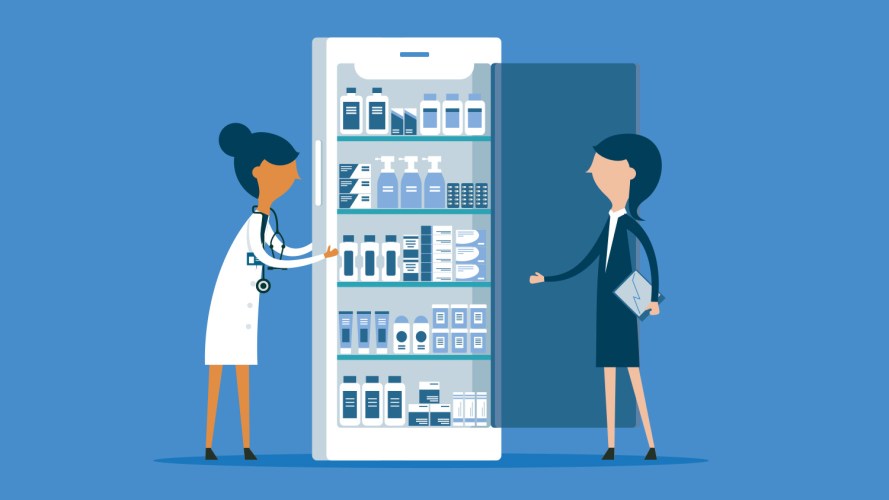Building strong relationships is the key to successful sales. In the healthcare and life sciences industries, those relationships have traditionally developed in person. Over the past decade, however, regulations have sharply cut back on personal contact. Visits to a doctor’s office to hand out drug samples are more limited, as are “lunch and learn” sessions to explain the latest technology to staff. And the same goes for scrubbing in to assist physicians with equipment in the OR (operating room) – conventionally one of the best methods to cement bonds and pave the way to future business.
When the pandemic hit, it delivered a knockout blow, with infection control protocols ending in-person visits. Though those visits have been restored to some degree, access is more restricted than ever. The new normal for sales professionals is a hybrid approach with an accent on digital contact.
However, that’s just fine for physicians who have discovered they like remote meetings. A recent survey by Bain & Company found that while 75% of physicians preferred in-person sales visits before the pandemic, nearly half now say they prefer virtual exchanges. And 43% said their employers are likely to limit in-person interactions even after the virus threat ends.
Regulations and technology have ensured remote contact is here to stay, and it is ramping up the pressure on salespeople, forcing them to develop a new approach for personalized prospecting and selling – and fast. Success rates for cold calling, even for skilled professionals, hover around 2%.
But there’s also some good news. McKinsey Research has found that businesses across every industry are becoming more comfortable with larger virtual deals. So if you make the right contacts and establish strong virtual connections, you may be able to increase your sales volume without traveling. At five firms the company analyzed, 90% of deals under $100,000 were concluded with no meetings. Twelve percent of companies surveyed said they would be comfortable closing deals of $500,000 to $1 million without face-to-face interactions, and 15% said the same for deals worth over $1 million.
To initiate a successful deal without a handshake or a demo, you need to know far more about a clinician than who they are and where they work. Today’s medical sales reps are spending countless hours poring over social media, news articles, industry websites, and other sources, reading anything they can get their hands on to find good prospects. Then they comb through their own customer relationship management (CRM) platform, entering prospects one by one and hoping to uncover a connection to a previous or current customer, or perhaps someone a colleague has spoken with in the past.
This yields “relationship intelligence,” which is essential for turning cold contacts into warm leads. But gathering it manually is an exhausting, tedious, and discouraging process that keeps sales reps from doing what they do best – explaining and selling their products to the people who need them.
Drive sales with connections in B2B Healthcare and Life Sciences
With Relationship Insights, Einstein helps to leverage existing networks to unlock new opportunities, and to drive sales efficiency by automating and consolidating research efforts.



A powerful artificial intelligence (AI) assistant
Today’s AI applications eliminate the drudge work of relationship intelligence, finding good prospects faster and giving sales reps more quality time to spend with them. AI algorithms work at lighting speed, parsing thousands of LinkedIn bios of physicians and researchers, as well as data from healthcare news sites, and scientific journals. They note personal details, like where physicians and scientists went to medical school, where they did their residencies or obtained post-doc fellowships, what their specialties are, and which hospitals and institutions they’ve worked with.
By quickly compiling this information behind the scenes, AI finds clinicians and researchers whose services, interests, and expertise match up precisely with the kinds of drugs or devices salespeople are offering.
And like a diligent personal assistant, an AI application keeps turning up more connections for you as it works. For example, if Dr. Smith was one of 10 physicians participating in a clinical trial for a drug similar to one you sell, the application will show you valuable background information on not only Dr. Smith, but the other nine participants. Now you have more prospects to pursue and detailed knowledge about each one, helping you tailor your pitches to a chronically busy and impatient audience.
The CRM connection
If an AI application pushes all the information it finds on the web directly to your CRM, your chances of gaining a warm introduction become much greater. Now you no longer have to manually search that system for customers or colleagues who might know one of the trial doctors. Algorithms do it for you – and they also search for anyone who knows physicians the doctors trained with, or their med school classmates, or their research partners and coauthors from previous investigations, and more.
In addition to working with the CRM, some AI programs also search through mountains of unstructured company data, including emails, documents, invoices, and chat and productivity applications, revealing connections that would otherwise have escaped your attention. Any one of them can transform a cold call into a warm lead that drives a sale.
By using AI internally and externally, you get better leads, more effective presentations, a constantly expanding network, and ultimately, more sales with less effort. According to the Harvard Business Review, AI can increase sales leads and appointments by 50%.
Easy to process, easy to share
AI relationship intelligence tools also provide a couple of other noteworthy benefits. Instead of compiling spreadsheets with all the data unearthed, many of these tools can visualize data in easy-to-grasp diagrams with snippets of text alongside them to add context – for example, how Customer A knows Prospect B. Organizing information in this way makes reaching out an easy, natural process. And if you have a lead scoring tool, it will point you to the best place to begin.
Also, as new leads multiply, many tools will allow you to efficiently divide and conquer by easily sharing incoming AI information with colleagues. By helping everyone reach out to the right people with compelling pitches, AI can boost the success of the entire team.
Automate relationship discovery in healthcare sales
Medtech and pharmaceutical reps have to find new ways to engage with their customers to create relationships that move deals forward. Learn how technology can uncover key connections in B2B Healthcare and Life Sciences to drive more sales.































